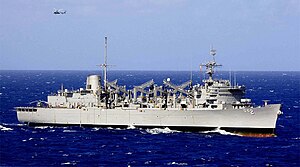USS Camden (AOE-2)
This article needs additional citations for verification. (December 2007) |
 USS Camden (AOE-2)
| |
| History | |
|---|---|
| Name | USS Camden |
| Namesake | Camden, New Jersey |
| Awarded | 25 April 1963 |
| Builder | New York Shipbuilding |
| Cost | Approx. $458 million |
| Laid down | 17 February 1964 |
| Launched | 29 May 1965 |
| Acquired | 11 March 1967 |
| Commissioned | 1 April 1967 |
| Decommissioned | 14 October 2005 |
| Stricken | 14 October 2005 |
| Homeport | Bremerton, Washington |
| Identification | 05833 |
| Motto | Flexibility, Readiness, Endurance |
| Nickname(s) | The Powerful Pachyderm of the Pacific |
| Honors and awards |
|
| Fate | Scrapped at ESCO Marine, Brownsville, Texas. Scrapping complete May 13, 2008 |
| General characteristics | |
| Class and type | Sacramento-class fast combat support ship |
| Displacement |
|
| Length | 796 ft (243 m) |
| Beam | 107 ft (33 m) |
| Draft | 38 ft (12 m) |
| Propulsion | |
| Speed | 30 knots (56 km/h; 35 mph) |
| Boats & landing craft carried |
|
| Capacity |
|
| Complement | 27 officers, 587 enlisted |
| Armament |
|
| Aircraft carried | 2 × SH-60 Seahawk Helicopters |
USS Camden (AOE-2) was the second ship of the United States Navy named after the city of Camden, New Jersey that lies on the Delaware River across from Philadelphia, Pennsylvania. It was a Sacramento-class fast combat support ship, combining the functions of three logistic support ships in one hull - fleet oiler (AO), ammunition ship (AE), and refrigerated stores ship (AF).
History[]

Camden was commissioned on 1 April 1967 as the second of four vessels in its class. It was also the 542nd and final contract in the 68-year history of New York Shipbuilding, and the last vessel completed and launched at the shipyard. It was assigned to the Pacific Fleet in September 1967 and was initially homeported in Long Beach, California. For their accomplishments during her first deployment to WestPac in 1968–1969, her crew was awarded the Meritorious Unit Commendation.
In August 1974, Camden moved to its new homeport of Bremerton, Washington. The ship operated extensively up and down the West Coast of the United States and deployed frequently to the Western Pacific and Indian Oceans to support units of the Seventh Fleet.
In 1980, Camden moved again to the homeport of Bremerton, Washington for an overhaul.
On 20 July 1983 The New York Times reported that Camden along with seven other vessels in the Ranger Carrier Battle Group left San Diego on Friday 15 July 1983 and were headed for the western Pacific when they were rerouted and ordered to steam for Central America to conduct training and flight operations in areas off the coasts of Nicaragua, El Salvador and Honduras as part of major military exercises planned for that summer. The battle group comprised the carrier Ranger, the cruiser Horne, the guided missile destroyer Lynde McCormick, the destroyers Fletcher and Fife, the frigate Marvin Shields, the oiler Wichita and the support ship Camden.
On 17 May 1987 USS Camden was redirected to assist USS Stark after it was attacked by unfriendly fire. USS Camden's job was to unload all of the weapons on board Stark in case of further attack.
On 15 August 1991 four airmen from Helicopter Combat Support Squadron 11 (HC-11 "Gunbearers") were missing and presumed dead after their helicopter crashed while resupplying ships in the Pacific Ocean 100 miles (160 km) east Wake Island. Search efforts were abandoned about 24 hours later for the Sea Knight, which had been operating from Camden. Two ships were close by when the aircraft dropped into the water. Two helicopters were immediately launched for an air search, and the ships in the area launched whaleboats to assist in the search. Camden was deployed to resupply the aircraft carrier USS Nimitz and support ships, which were returning to the U.S. from duty in the Persian Gulf after taking part in Operation Desert Storm.[1]
In March 1996, Camden was awarded its third consecutive Battle "E" for demonstrating excellence in all warfare and mission categories.
In October 2000, Camden participated in Operation Determined Response, providing rescue assistance and hospitality services in support of USS Cole in the Yemeni port of Aden damaged in a terrorist attack.[2]
In 2004, Camden won the Battle "E" again. This was the final year of Battle "E" eligibility for the Sacramento-class fast combat support ship.
In January 2005, Camden left on its final deployment, an eight-month world tour with USS Carl Vinson escorting that carrier to its new homeport in Norfolk, Virginia. Camden was decommissioned 14 October 2005 at Naval Base Kitsap, Bremerton, Washington, and was disposed of by scrapping at Esco Marine, in Brownsville, Texas.
Power plant[]
Camden's power plant was one of two built for the Iowa-class battleship USS Kentucky, which was cancelled in 1947 when 72.1 percent complete. The other Kentucky power plant was used to power USS Sacramento, the lead ship of her class.
References[]
- ^ "4 Crewmen Lost as Navy Copter Crashes at Sea". Los Angeles Times. 17 August 1991. Retrieved 3 January 2019.
- ^ "CDR Karl R. Tenney". www.public.navy.mil. Retrieved 2018-05-31.
External links[]
| Wikimedia Commons has media related to USS Camden (AOE-2). |
- Sacramento-class fast combat support ships
- United States Navy New Jersey-related ships
- 1965 ships
- Gulf War ships of the United States